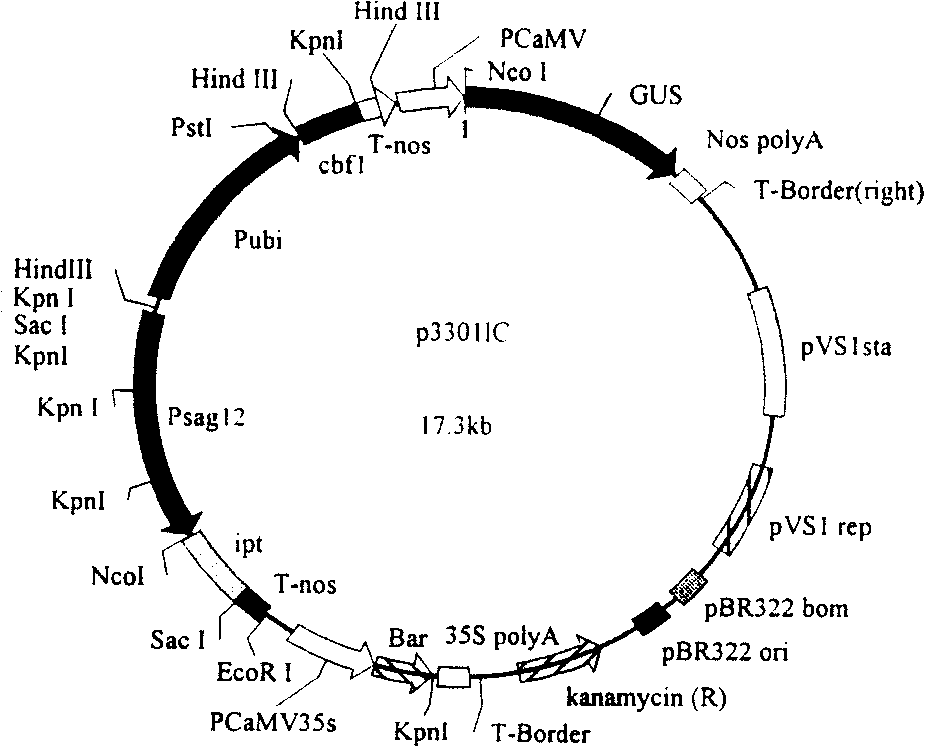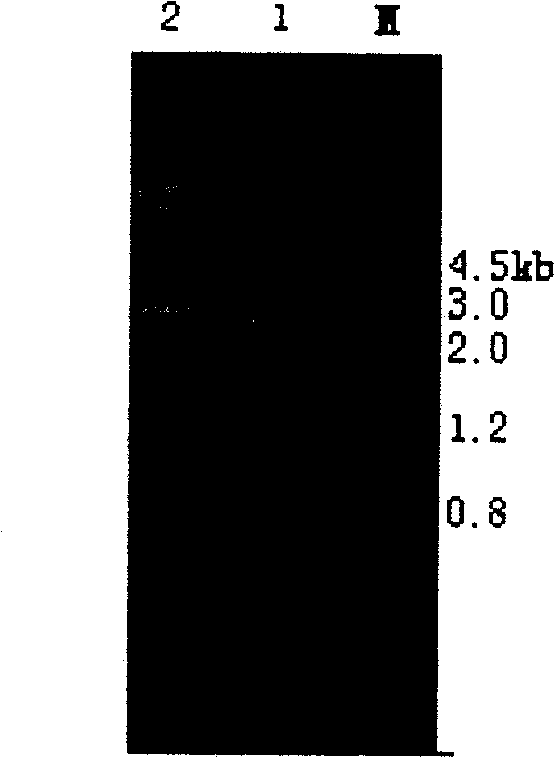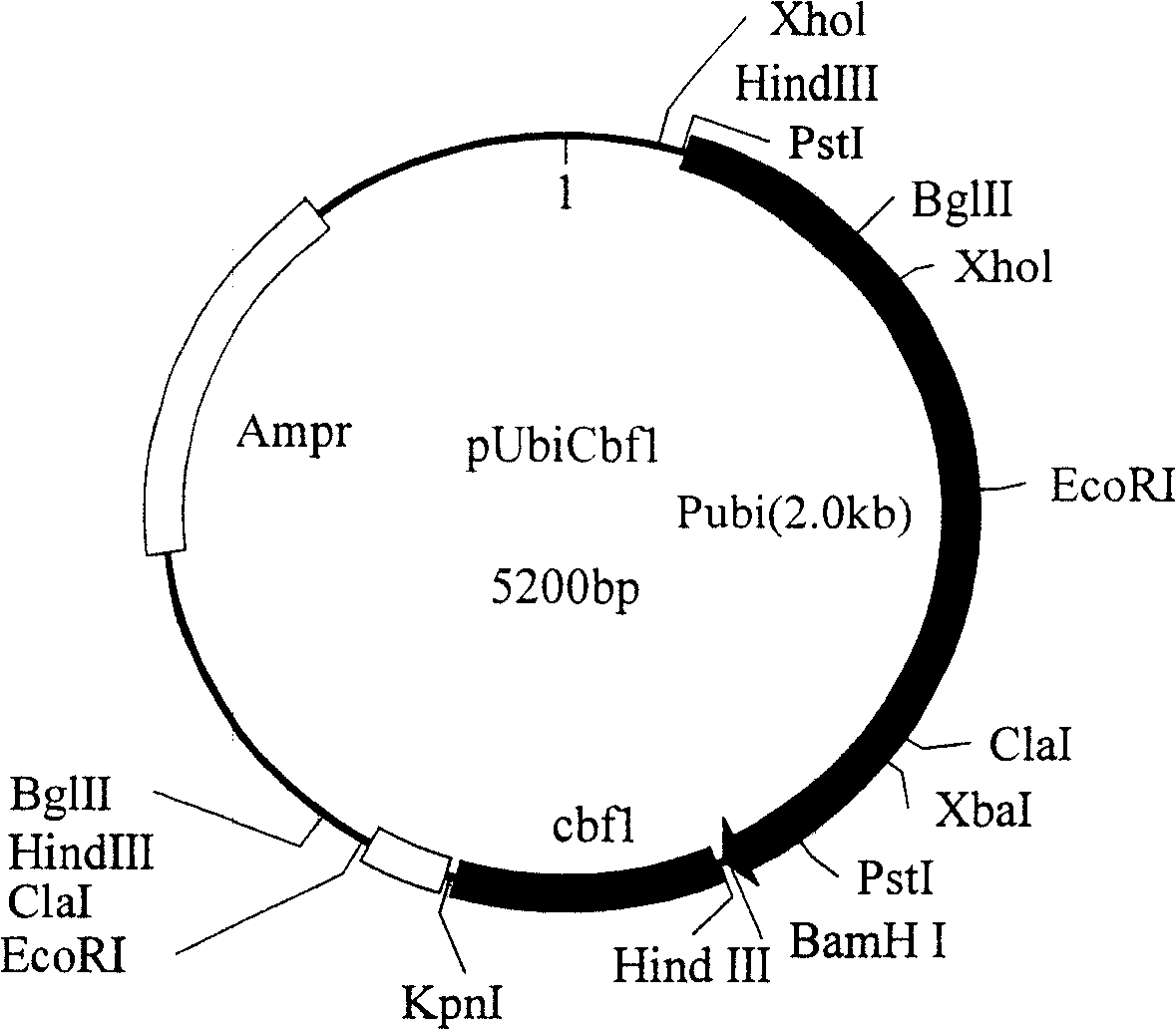Plant bivalent anti-reverse gene bielement expression carrier
A binary expression vector and gene technology, applied in the direction of using vectors to introduce foreign genetic material, DNA/RNA fragments, recombinant DNA technology, etc., can solve the problems of increased independent genetic probability and difficulty in obtaining stable transgenic strains, etc., and achieve the goal of constructing The steps are simple, the effect of enhancing resistance and prolonging the green period
- Summary
- Abstract
- Description
- Claims
- Application Information
AI Technical Summary
Problems solved by technology
Method used
Image
Examples
Embodiment 1
[0034] Example 1 Construction of vector p3301-Nos
[0035] 1. Experimental materials and kits
[0036] The restriction endonuclease and ligase kits used were all produced by NEB Company, and the column centrifugation kit produced by Tsinghua Tianwei Times Company was used for DNA fragment recovery. Escherichia coli competent cells were purchased from Tsinghua Tianwei Times Company. Plasmid extraction was performed with a kit produced by Tsinghua Tianwei Times Company, and all operating procedures were carried out according to the instructions of the kit.
[0037] 2. Experimental content
[0038] The intermediate vector pSAGI was digested with EcoR I and SacI, and the 0.3kb T-Nos fragment was recovered. At the same time, the binary vector p3301 was digested with EcoR I and SacI, and the 11.3kb fragment was recovered as a vector, and the two fragments were ligated with T4-DNA ligase. At the corresponding site, the vector p3301-nos was obtained, and the 5' end of the newly ins...
Embodiment 2
[0072] Example 2 Construction of vector p3301C-nos
[0073]Reagent equipment and experimental procedure are identical with embodiment 1, and experimental content is as follows:
[0074] Digest the cloning vector pUBC with endonuclease Hind III, recover about 3kb fusion gene Pubi-cbf1 fragment; Connected to the Hind III site of p3301-nos to obtain the vector p3301C-nos, in which the fusion gene Pubi-cbf1 is in a clockwise direction, and there is a SacI single enzyme cutting site at the 5' end of the newly inserted T-nos on p3301C-nos point. see Figure 5 , 6.
[0075] The reaction system is Hind III single enzyme system:
[0076] Plasmid 5μl (about 1μg)
[0077] 10×buffer 2 0.5μl
[0078] Hind III 0.5μl (about 5 units)
[0079] wxya 2 O 44μl
[0080]
[0081] Total 50μl
Embodiment 3
[0082] Example 3 Construction of bivalent binary vector p3301IC
[0083] Reagent equipment and experimental procedure are identical with embodiment 1, and experimental content is as follows:
[0084] Cut the intermediate cloning vector pSAGI with endonuclease Sac I, and recover the about 2.7kb fusion gene Psag without T-nos 12 -ipt fragment, while using endonuclease Sac I to digest the carrier p3301C-nos, reclaim the large fragment in the digested product as a carrier, and use the fusion gene Psag without T-nos 12 The -ipt fragment is forward inserted into the SacI site of p3301C-nos to obtain the bivalent binary vector p3301IC. see Figure 7 ,2.
[0085] The reaction system is Sac I single enzyme digestion system:
[0086] Plasmid 5μl (about 1μg)
[0087] 10×buffer 10.5μl
[0088] SacI 0.5μl (about 5 units)
[0089] 10×BSA 0.5μl
[0090] wxya 2 O 43.5 μl
[0091]
[0092] Total 50μl
PUM
 Login to View More
Login to View More Abstract
Description
Claims
Application Information
 Login to View More
Login to View More - R&D
- Intellectual Property
- Life Sciences
- Materials
- Tech Scout
- Unparalleled Data Quality
- Higher Quality Content
- 60% Fewer Hallucinations
Browse by: Latest US Patents, China's latest patents, Technical Efficacy Thesaurus, Application Domain, Technology Topic, Popular Technical Reports.
© 2025 PatSnap. All rights reserved.Legal|Privacy policy|Modern Slavery Act Transparency Statement|Sitemap|About US| Contact US: help@patsnap.com



